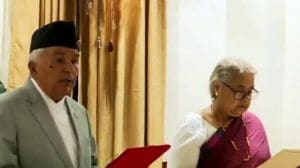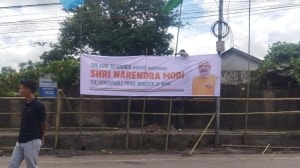Reel or real?
‘‘A 240-kilogram cake,’’ I yelled, watching the telly the other day. ‘‘That’s one heck of a way to apprec...

‘‘A 240-kilogram cake,’’ I yelled, watching the telly the other day. ‘‘That’s one heck of a way to appreciate your leader. Look at the love and appreciation of the sacrifice made by Sonia Gandhi.’’
‘‘Oh yeah,’ broke in my Sydney-born grandnephew, Anananya, a keen India watcher, ‘‘if they are so enamored of her sacrifice, why don’t a few Congressmen renounce politics.’’
‘‘If everyone sacrifices, who will be there to appreciate sacrifice,’’ I told my grandnephew. ‘‘Besides for many of the Congressmen, Sonia is like a mother who saved them.’’
‘‘Obviously sacrifice has acquired a new meaning here — one for Sonia and another for Congressmen,’’ wondered Anananya. ‘‘But if it is Congressman celebrating their mother’s birthday on the one hand, there is a gigantic clash between the two brothers — Anil and Mukesh Ambani — on the other. When will it all end? Or will it? The brothers are only talking to each other through the media.’’
‘‘You know every conflict has acquired a TV serial-like quality,’’ I explained, ‘‘there is usually a twist to every turn. There is always a conflict in joint families in India, but when it comes to a feud between brothers, it has all the elements of a soap — for Mukesh, it is the mental conflict between farz or duty and the undying love for his brother.’’
‘‘And doesn’t Anil also feel the same way?’’ asked Anananya.
‘‘In the case of Anil, it is not only love for his brother Mukesh but his other brother Amar Singh,’’ I explained. ‘‘If it was a Hindi movie, Amar could well have been the third brother lost in a crowded village fair who surfaces just before the interval break. The typical Indian movie catches the emotions, the pathos — it is always a roller coaster ride.’’
‘‘But this is not a movie,’’ interjected Anananya.
‘‘Which is the reason it is more realistic,’’ I countered. ‘‘Look at the way the third brother, Amar Singh, suggests that the mother should solve the dispute.’’
‘‘Can’t they settle their dispute in a pub?’’ asked Anananya.
‘‘And spoil all the fun?’’ I pointed out. ‘‘In the film Deewar, one brother says he has got all the wealth in the world but the other counters that their mother is with him.’’
‘‘You mean the one with the mother doesn’t get Reliance?’’ asked Anananya.
‘‘We never know which way the wind blows,’’ I pointed out, ‘‘but I can assure you that like all endings, this one too will leave you crying.’’
‘‘I hope not the shareholders,’’ countered Anananya. ‘‘Which brings me to another news item about this Shankaracharya. Isn’t he the equivalent of the holy Pope? And if he is, how can he be treated this way?’’
‘‘No one in India knows,’’ I replied, ‘‘but let me tell you that Shankaracharya is not the only claimant to espousing the Hindu cause. The BJP thinks it is the official Hindu party, Ashok Singhal and Giriraj Kishore claim to be the guardians of Hinduism, Uma Bharati is a sanyasin who spends her time between the Himalayas and the Chief Minister’s Office in Bhopal…’’
‘‘Would the Hindus be upset with the arrest?’’ was the question.
‘‘In every high-profile arrest, we have a Narasimha Rao coinage: the law will take its own course,’’ I replied. ‘‘No one knows what that means. But most Hindus watch current events like films, only for entertainment value. Once the movie is over, they go about their household chores as if nothing has happened.’’
Photos





- 01
- 02
- 03
- 04
- 05


























